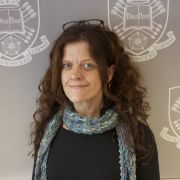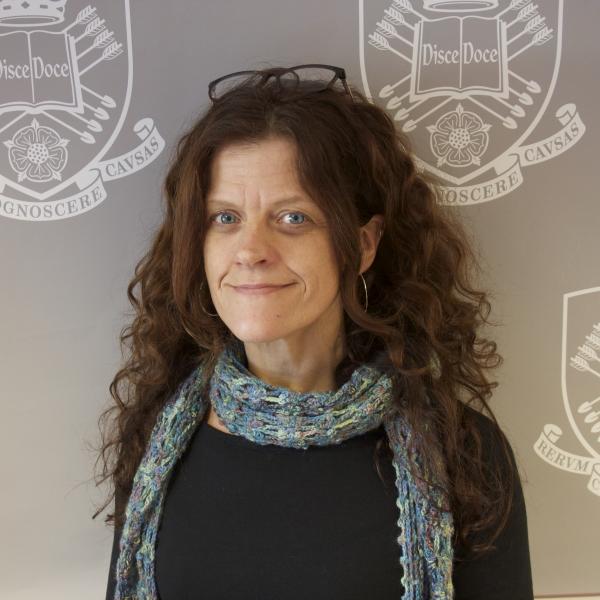Dr Julie Walsh
BA, MSc, PhD
Department of Sociological Studies
Senior Lecturer in Sociology
(She/her)


+44 114 222 6418
Full contact details
Department of Sociological Studies
The Wave
2 Whitham Road
Sheffield
S10 2AH
- Profile
-
Julie joined The Department of Sociological Studies in 2016 and, in 2018, she became a Lecturer in Sociology. Julie completed her PhD in 2015, the focus of her study being the role of ‘family’ in community connectedness in an increasingly diverse northern city.
This research interest grew out of Julie’s previous career in youth work & community development, where she eventually specialised in the management of user-led provision, working with marginalised and disadvantaged communities.
Following this, Julie developed her research interests working as a Postdoctoral Researcher working on the NORFACE funded Family Complexity and Social Work Project (FACSK).
This study examined conceptualisations of ‘family’ in eight comparative welfare states and if and how understandings of ‘family’ impacted on the ways in which social care professionals worked with families.
Julie’s ongoing research interests continue to reflect these themes and she is currently the PI for an ESRC funded project that examines the intersections of place, immigration policy, migrant families everyday lives and social care practice.
Julie also has a broader interest in social constructions of 'family', relatedness, belonging and personal life and she is a Co-convenor of the BSA Families and Relationships Study Group.
- Qualifications
-
- BA (Hons) International English (Hull)
- MSc Applied Social Research (Hull)
- PhD Sociology, Anthropology & Gender Studies (Hull)
- Research interests
-
Julie’s research interests grew from her practice based work in youth and community work settings and include family, migration, personal life, childhood and the influence of prevalent narratives on everyday life.
Julie’s previous research has included working with migrant and settled communities to understand transnational family making practices, relationality, culturally located perceptions of ‘the family’ and, in turn, if these perceptions impact on connectivity between diverse communities.
Julie’s interests also include the ways in which social care professionals conceptualise ‘family’, and if and how this is affected by broader narratives. In early 2017, she joined the Family Complexity and Social Work Project (FACSK - funded by NORFACE) as a Postdoctoral Researcher. This international comparative study examined how social workers in different welfare contexts work with families with complex needs.
Julie currently holds an ESRC New Investigator grant, the title of which is “Everyday Bordering' in the UK: The impact on social care practitioners and the migrant families with whom they work”.
As such, she continues to research themes that focus on understanding how governance of the family as an institution intersects with immigration policy, and whether and in what ways this impacts of the everyday lives of migrant families and social care practitioners.
Julie also has a long-standing interest in collaborative approaches to working with communities, and employing innovative qualitative methods to do so.
Research areas:
- Family relationships, childhood and social change.
- Cross-cultural constructions of 'family’.
- The relationship between the state and the ‘family’.
- Community connectivity.
- Everyday life.
- Qualitative methodologies
- Publications
-
Journal articles
- ‘Everyday Bordering’ in England, Sweden and Bulgaria: Social Work Decision-Making Processes When Working with Migrant Family Members. Journal of International Migration and Integration.


- Correction to: ‘Everyday Bordering’ in England, Sweden and Bulgaria: Social Work Decision-Making Processes When Working with Migrant Family Members (Journal of International Migration and Integration, (2021), 10.1007/s12134-021-00838-w). Journal of International Migration and Integration.


- Gender, parenting and practices in child welfare social work? A comparative study from England, Ireland, Norway and Sweden. British Journal of Social Work. View this article in WRRO


- Family display, family type, or community? Limitations in the application of a concept. Families, Relationships and Societies. View this article in WRRO


- What about the fathers? The presence and absence of the father in social work practice in England, Ireland, Norway, and Sweden-A comparative study. Child & Family Social Work, 24(1), 148-155. View this article in WRRO


- How do you solve a problem like Maria? Family complexity and institutional complications in UK social work. European Journal of Social Work, 22(6), 1050-1061. View this article in WRRO


- Some Useful Sources. Social Policy and Society, 17(4), 679-681.


- Walking the Walk: Changing Familial Forms, Government Policy and Everyday Social Work Practice in England. Social Policy and Society, 17(4), 603-618. View this article in WRRO


- Introduction: Families, Social Work and the Welfare State: Where Contemporary ‘Family’ Meets Policy and Practice. Social Policy and Society, 17(4), 599-602.


- Migrant Family Display: A Strategy for Achieving Recognition and Validation in the Host Country. Sociological Research Online, 23(1), 67-83. View this article in WRRO


- Displaying Families, Migrant Families and Community Connectedness: The Application of an Emerging Concept in Family Life. Journal of Comparative Family Studies, 44(6), 689-698.


- The colonised self: the politics of UK asylum practices, and the embodiment of colonial power in lived experience. Social Sciences, 12(7).


- Portholes of Ethnography: the methodological learning from 'being there' at a distance.. British Journal of Sociology.


Chapters
- Commentary on Chapter 4 (Response 2): Considering Belonging Through ‘Display’, Contextualizing Childhoods (pp. 99-105). Springer International Publishing


- Displaying Across Borders: The Role of Family Display in Maintaining Transnational Intergenerational Relations In Juozeliuniene I & Seymour J (Ed.), Family Change in Times of the De-bordering of Europe and Global Mobility: Resources, Processes and Practices (pp. 340-358). Vilnius, Lithuania: Vilnius University Press.


Website content
- Migrant families, Covid-19 travel restrictions, and everyday bordering.


- COVID travel restrictions have created new borders for migrants who want to visit home.


- Collaborative research: the potential of COVID contingencies..


- ‘Reproducing the Stereotypes’: Family Complexity, Resource Scarcity and Social Work Decision-Making..


- 'Not one of you any longer': EU Nationals' Brexit uncertainty and mistrust..


Other
- Doing ethnography online: A lockdown research case study.


- Evaluation: New Beginnings Greater Manchester Pilot Project. The University of Sheffield.


- (Eds) Themed Section: ‘Families, Social Work and the Welfare State: Where contemporary “family”, meets policy and practice’. Journal of Social Policy and Society..


- Working with Migrant Communities: a resource for practitioners.


- ‘Everyday Bordering’ in England, Sweden and Bulgaria: Social Work Decision-Making Processes When Working with Migrant Family Members. Journal of International Migration and Integration.
- Teaching activities
-
Julie currently teaches and supervises students at both undergraduate and postgraduate levels. She strives to be inclusive, to respond to the needs of students and is committed to encouraging critical thinking and achieving high standards in teaching.
All of Julie’s teaching is closely linked to her research interests and, via a range of tools, she encourages students to link theory with their own social worlds.
Julie’s teaching includes:
- SCS2006 – Sociology of ‘Family’ (undergraduate).
- SCS6107 – Researching Society (postgraduate).
Julie supervises undergraduate and postgraduate student dissertations across the range of programmes offered in the Department.
Julie also supervises doctoral students and she welcomes applications to study full or part-time with her for PhD research degrees relating to any of her interests.
